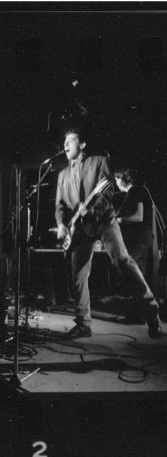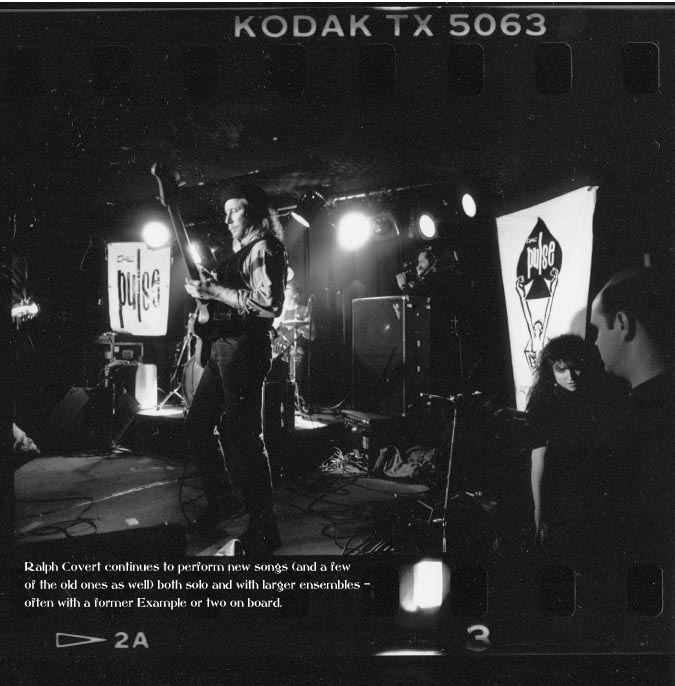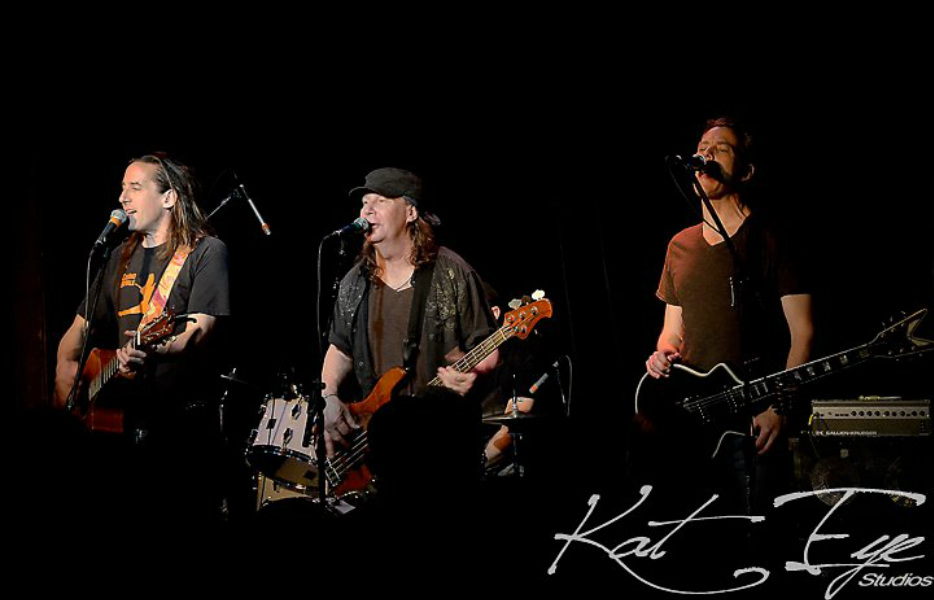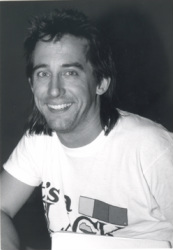
Welcome. We will be sharing stories, historical details, links to songs and videos, and doing our best to entertain you with tales from from our wonderful wasted youth with the traveling circus commonly known as The Bad Examples. This bio is a start -- start tuned for more stories and pictures to come!
The Bad Examples were formed in March 1987 by Ralph Covert, Terry Wathen, and Greg Balk. They asked lead guitar player Tommy O'Brien to join as well, but O'Brien was playing in four or five other bands at the time. The band began gigging almost immediately, and made the recordings which became the MEAT album within the first two months of the band's life. O'Brien joined the band a year later, followed shortly by bassist Pickles Piekarski, and the first great line up of the band crystalized around the album Bad Is Beautiful. By the mid-90's The Bad Examples were touring nationally in America and in Holland, but break-through success eluded them. The band went on hiatus in the early 2000's as leader Ralph Covert's children's music project Ralph's World exploded nationally, and since 2002 the band has continued playing explosive live shows and released several albums, including the critically acclaimed Smash Record on 2011.
The Bad Examples were formed in March 1987 by Ralph Covert, Terry Wathen, and Greg Balk. They asked lead guitar player Tommy O'Brien to join as well, but O'Brien was playing in four or five other bands at the time. The band began gigging almost immediately, and made the recordings which became the MEAT album within the first two months of the band's life. O'Brien joined the band a year later, followed shortly by bassist Pickles Piekarski, and the first great line up of the band crystalized around the album Bad Is Beautiful. By the mid-90's The Bad Examples were touring nationally in America and in Holland, but break-through success eluded them. The band went on hiatus in the early 2000's as leader Ralph Covert's children's music project Ralph's World exploded nationally, and since 2002 the band has continued playing explosive live shows and released several albums, including the critically acclaimed Smash Record on 2011.
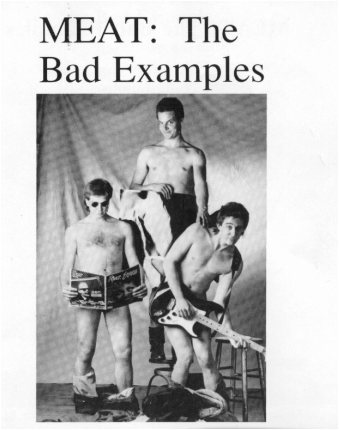
Ralph Covert recalls the band's first days:
"On March 15, 1987, Terry Wathen, Greg Balk, and I were in my parent's basement, wedged between the couch, the TV, and a six foot long wooden horse my Uncle Marv gave my family years ago. Greg and I had been auditioning drummers for months, trying to put a band together. Several musician friends had mentioned Terry to me, saying they thought his playing would be a natural fit for my music - they were right. We played one song, "Bad Girl," and we all knew we had a match.
We needed a tape to get gigs, so near the end of May we went into the studio to make a club demo. We blasted through six songs, using only thirteen hours of studio time for recording, overdubbing, and mixing. The addition of two songs I had recorded prior to putting the band together made just enough material to fill some odd length tape someone had given me, so we made some covers at Kinko's, duped the tapes on my dubbing deck, and Meat was born. Feeling the need for a gimmick to get the attention of the drunks in the dive bars we were playing, we taped a condom to every tape -- you can bet we considered ourselves quite brazen at the time. These were the days before safe sex and condom machines, and I've always suspected a couple of our early sales were to people buying a rubber with a tape attached.
There were no plans to make any more copies after the original 48 tapes were gone, but to our surprise we began getting requests from people who had heard it and wanted their own copy, so we happily made more. Several times after that we decided to just let Meat fade away, but fan interest always mounted until we finally realized the obvious -- whether or not we intended it to be an album, it was one."
"On March 15, 1987, Terry Wathen, Greg Balk, and I were in my parent's basement, wedged between the couch, the TV, and a six foot long wooden horse my Uncle Marv gave my family years ago. Greg and I had been auditioning drummers for months, trying to put a band together. Several musician friends had mentioned Terry to me, saying they thought his playing would be a natural fit for my music - they were right. We played one song, "Bad Girl," and we all knew we had a match.
We needed a tape to get gigs, so near the end of May we went into the studio to make a club demo. We blasted through six songs, using only thirteen hours of studio time for recording, overdubbing, and mixing. The addition of two songs I had recorded prior to putting the band together made just enough material to fill some odd length tape someone had given me, so we made some covers at Kinko's, duped the tapes on my dubbing deck, and Meat was born. Feeling the need for a gimmick to get the attention of the drunks in the dive bars we were playing, we taped a condom to every tape -- you can bet we considered ourselves quite brazen at the time. These were the days before safe sex and condom machines, and I've always suspected a couple of our early sales were to people buying a rubber with a tape attached.
There were no plans to make any more copies after the original 48 tapes were gone, but to our surprise we began getting requests from people who had heard it and wanted their own copy, so we happily made more. Several times after that we decided to just let Meat fade away, but fan interest always mounted until we finally realized the obvious -- whether or not we intended it to be an album, it was one."
By October 1987 Joe Campagna had joined the band on lead guitar. In early 1988 the band met with Michael Freeman to discuss plans for Freeman to work with the band on its next album. Freeman had heard MEAT, and had been impressed enough by what he'd heard that he was interested in taking a chance on the young band.
Almost exactly one year into its young life, in March of 1988, Greg Balk and Joe Campagna quit the band. That next week end Ralph was out at a bar and bumped into Tommy O'Brien. Tommy asked how the band was doing, and mentioned that he had always regretted not joining when asked. When Ralph filled him in on Greg and Joe quitting, Tommy smiled and said, "Well, I guess we need to start looking for a bass player, then!"
The search went on into the next fall. The band continued to play occasional shows with a number of different bass players, including Mark Malbouef, who years later co-produced the Birthday album with Ralph. Pickles Piekarski became available when long-time club hits Mike Jordan and the Rockamatics broke up. After considerable discussion, he agreed to join the band, and the first great Bad Examples line-up was in place: Terry Wathen, Ralph Covert, Tommy O'Brien, and Pickles Piekarski.
As the band continued to play around town, their reputation as a great live band began to grow. Work resumed on a follow up album to MEAT. The band recorded an album's worth of demos in the Wicker Park apartment of their soundman, Rob Williams. Michael Freeman was retained as producer, and work began at Short Order Recorder, with the band putting all of their gig money toward studio costs.
Almost exactly one year into its young life, in March of 1988, Greg Balk and Joe Campagna quit the band. That next week end Ralph was out at a bar and bumped into Tommy O'Brien. Tommy asked how the band was doing, and mentioned that he had always regretted not joining when asked. When Ralph filled him in on Greg and Joe quitting, Tommy smiled and said, "Well, I guess we need to start looking for a bass player, then!"
The search went on into the next fall. The band continued to play occasional shows with a number of different bass players, including Mark Malbouef, who years later co-produced the Birthday album with Ralph. Pickles Piekarski became available when long-time club hits Mike Jordan and the Rockamatics broke up. After considerable discussion, he agreed to join the band, and the first great Bad Examples line-up was in place: Terry Wathen, Ralph Covert, Tommy O'Brien, and Pickles Piekarski.
As the band continued to play around town, their reputation as a great live band began to grow. Work resumed on a follow up album to MEAT. The band recorded an album's worth of demos in the Wicker Park apartment of their soundman, Rob Williams. Michael Freeman was retained as producer, and work began at Short Order Recorder, with the band putting all of their gig money toward studio costs.
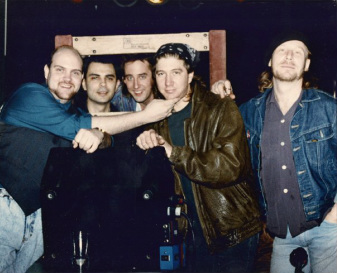
At this point, guitarist Tommy O'Brien gave the band notice that he would be unable to tour, and, after a month of auditions, blues great John Duich was hired to replace Tommy. The original "Bad Is Beautiful" album did not include "Ragtime to Rags," had a different version of "Not Dead Yet," and had a slightly different version of "Ashes of My Heart."
As 1990 rolled to a close and Waterdog prepared to release the album, CNR announced the first of a number of postponements of the European release. The band members had all quit their jobs to start touring, and so in December Ralph, Terry, Pickles and John headed out in their newly purchased motor home on "The Take It On The Chin Tour," their first road trip. The band had given it that nickname as the tour approached because they knew they were heading into all brand-new markets, and they would have to fight for every fan they made. The tour started in Chicago, and looped down through West Virginia into the southeast to Charleston, South Carolina, then around back north.
Dutch A&R man Ronald van der Meijden from CNR flew over to travel with the band for the last leg of the tour, as the boys drove north into the freezing midwest winter. This was right around the time Styx had decided to record a version of "Not Dead Yet," and both band and labels felt it was important to re-record the song. Ralph had just written "Ragtime to Rags," and everyone felt it added a nice depth to the album, so it was redone as well. "Ashes of My Heart" had not had a bridge in its original released version, and through a little studio wizardry one was added which improved the song immensely.
Winter of '91 was a very exciting time for the band. They had spent a full year touring, and were a well-oiled musical machine. On November 14th and 15th they recorded two consecutive nights at the Beat Kitchen. The 102 songs were the source for their Cheap Beer Night album released the following year. At the same time, Bad Is Beautiful was being released in America and Europe, after a year of delays. In Chicago, WXRT had added "One Perfect Moment" to its playlist, and the band was rising quickly to the top of the local talent pool. In Europe, "Promises in the Dark" was rushing up the charts, and a tour was scheduled opening for Dutch legends Golden Earring. So it was that on New Year's Eve the band played a marathon show at the Clearwater Saloon, and, with Jay Whitehouse of Waterdog Records and road manager Mike Byrne, boarded a plane a few hours later to fly to Europe.
For tour diary of that first European tour, read the liner notes from The Two-Meter Sessions. (Click on the link to visit it!)
In the six week period following the first European tour, the band's schedule was intense. Sold out shows two or three nights a week in town, interviews, and preparations for their first West Coast tour. WXRT was playing "One Perfect Moment" non-stop, and the BE's were on top of the heap. On tour, the motorhome, affectionately known to the band as "The Rig," collapsed in Texas in the first leg of the tour. The guys rented a mini-van and pushed on (Terry traveled 4,000 miles lying on his side on top of the gear in the back).
As 1990 rolled to a close and Waterdog prepared to release the album, CNR announced the first of a number of postponements of the European release. The band members had all quit their jobs to start touring, and so in December Ralph, Terry, Pickles and John headed out in their newly purchased motor home on "The Take It On The Chin Tour," their first road trip. The band had given it that nickname as the tour approached because they knew they were heading into all brand-new markets, and they would have to fight for every fan they made. The tour started in Chicago, and looped down through West Virginia into the southeast to Charleston, South Carolina, then around back north.
Dutch A&R man Ronald van der Meijden from CNR flew over to travel with the band for the last leg of the tour, as the boys drove north into the freezing midwest winter. This was right around the time Styx had decided to record a version of "Not Dead Yet," and both band and labels felt it was important to re-record the song. Ralph had just written "Ragtime to Rags," and everyone felt it added a nice depth to the album, so it was redone as well. "Ashes of My Heart" had not had a bridge in its original released version, and through a little studio wizardry one was added which improved the song immensely.
Winter of '91 was a very exciting time for the band. They had spent a full year touring, and were a well-oiled musical machine. On November 14th and 15th they recorded two consecutive nights at the Beat Kitchen. The 102 songs were the source for their Cheap Beer Night album released the following year. At the same time, Bad Is Beautiful was being released in America and Europe, after a year of delays. In Chicago, WXRT had added "One Perfect Moment" to its playlist, and the band was rising quickly to the top of the local talent pool. In Europe, "Promises in the Dark" was rushing up the charts, and a tour was scheduled opening for Dutch legends Golden Earring. So it was that on New Year's Eve the band played a marathon show at the Clearwater Saloon, and, with Jay Whitehouse of Waterdog Records and road manager Mike Byrne, boarded a plane a few hours later to fly to Europe.
For tour diary of that first European tour, read the liner notes from The Two-Meter Sessions. (Click on the link to visit it!)
In the six week period following the first European tour, the band's schedule was intense. Sold out shows two or three nights a week in town, interviews, and preparations for their first West Coast tour. WXRT was playing "One Perfect Moment" non-stop, and the BE's were on top of the heap. On tour, the motorhome, affectionately known to the band as "The Rig," collapsed in Texas in the first leg of the tour. The guys rented a mini-van and pushed on (Terry traveled 4,000 miles lying on his side on top of the gear in the back).
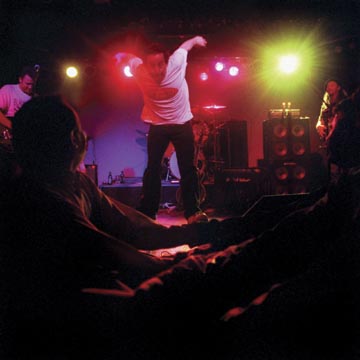
Ralph and Jay Whitehouse were in Cannes, France for MIDEM, the international music license conference, looking for a new European deal for the band when they heard that, back in America, Waterdog's distributor, Landmark, became embroiled in an ownership battle between its two major partners. As a result of the ensuing squabble Landmark was bankrupted, and most of the records they were handling, including Eat At Godot's, were left helpless in the marketplace. Waterdog itself was almost bankrupted as well, and only the tireless work of Whitehouse, label manager Rob Gillis, and the Waterdog staff kept the doors open.
Steve Gerlach had agreed to replace John, and the band renewed its energy in the face of yet another setback and pushed forwards. It was a very rich time for the band creatively. The release of Cheap Beer Night had cemented what was at the time a deep relationship with the Beat Kitchen, and the band rehearsed there two to three times a week during the day, and played three to four gigs a week, touring in ten day bursts out of Chicago. It was out of this explosive period of growth that the Kisses 50 Cents album was born. The band was debuting new songs every week, just like the old days with Tommy, and just like the first few years with John when they were touring nationally all the time. One day the band set up at the Beat Kitchen and recorded all its new songs so they could look at arrangements and plan the new record.
While the album was a creative success, Waterdog was still too badly damaged from the Landmark disaster to effectively promote the album. In January of 1995, Ralph's daughter Fiona was born, and the band took several months to rest and re-group. Not long after, both Terry Wathen, original drummer, and Steve Gerlach asked to step down from the band. That spring, Ralph recorded the basic tracks for what became the Birthday album, joined by Pickles, John Zdon (on guitar, organ, and vocals), and by Craig Miller (on harmonica and vocals).
As 1995 ended and 1996 began, Terry was replaced by John Richardson (Tommy Keene, Shoes, Badfinger). John Zdon, stepped up to replace Steve, and was then replaced by Tommy O'Brien, who returned to the job of lead guitar he had vacated four years earlier. As Ralph and Pickles told him the night of his first gig back, "You sound just like the guy on the album!" Steve Wozny, who had been Tommy's room-mate back in the Bad Is Beautiful days joined the band on keyboards. The band continued to play in the clubs.
Kisses 50 Cents and Eat At Godot's were released in Europe, and Ralph had a number of solo acoustic tours in Holland and England. He met up with a Dutch band called The Moondogs who made melodic pop-rock similar to The Bad Examples, and was hired by them to front the band on a Dutch tour. Ralph did some co-writing with them, and recorded some demos while he was in Holland in May of 1996.
In 1997 one of these songs, "Rikki Doesn't Worry," co-written with Moondog Rik Vrijman, won De Grote Prijs De Nederlands (a Dutch music award) for best lyrics.
In July of 1996, Popscape, a best of compilation, was released in the US. In October, the band headed over to Europe for a tour of Holland, France, and England. It was a disaster. The Dutch promoter was a crook and a liar, and within a week the tour had burst apart at the seams. Most of the band returned to Chicago, but Ralph and Pickles pushed on, salvaging what was left of the tour as an acoustic duo.
Steve Gerlach had agreed to replace John, and the band renewed its energy in the face of yet another setback and pushed forwards. It was a very rich time for the band creatively. The release of Cheap Beer Night had cemented what was at the time a deep relationship with the Beat Kitchen, and the band rehearsed there two to three times a week during the day, and played three to four gigs a week, touring in ten day bursts out of Chicago. It was out of this explosive period of growth that the Kisses 50 Cents album was born. The band was debuting new songs every week, just like the old days with Tommy, and just like the first few years with John when they were touring nationally all the time. One day the band set up at the Beat Kitchen and recorded all its new songs so they could look at arrangements and plan the new record.
While the album was a creative success, Waterdog was still too badly damaged from the Landmark disaster to effectively promote the album. In January of 1995, Ralph's daughter Fiona was born, and the band took several months to rest and re-group. Not long after, both Terry Wathen, original drummer, and Steve Gerlach asked to step down from the band. That spring, Ralph recorded the basic tracks for what became the Birthday album, joined by Pickles, John Zdon (on guitar, organ, and vocals), and by Craig Miller (on harmonica and vocals).
As 1995 ended and 1996 began, Terry was replaced by John Richardson (Tommy Keene, Shoes, Badfinger). John Zdon, stepped up to replace Steve, and was then replaced by Tommy O'Brien, who returned to the job of lead guitar he had vacated four years earlier. As Ralph and Pickles told him the night of his first gig back, "You sound just like the guy on the album!" Steve Wozny, who had been Tommy's room-mate back in the Bad Is Beautiful days joined the band on keyboards. The band continued to play in the clubs.
Kisses 50 Cents and Eat At Godot's were released in Europe, and Ralph had a number of solo acoustic tours in Holland and England. He met up with a Dutch band called The Moondogs who made melodic pop-rock similar to The Bad Examples, and was hired by them to front the band on a Dutch tour. Ralph did some co-writing with them, and recorded some demos while he was in Holland in May of 1996.
In 1997 one of these songs, "Rikki Doesn't Worry," co-written with Moondog Rik Vrijman, won De Grote Prijs De Nederlands (a Dutch music award) for best lyrics.
In July of 1996, Popscape, a best of compilation, was released in the US. In October, the band headed over to Europe for a tour of Holland, France, and England. It was a disaster. The Dutch promoter was a crook and a liar, and within a week the tour had burst apart at the seams. Most of the band returned to Chicago, but Ralph and Pickles pushed on, salvaging what was left of the tour as an acoustic duo.
In May of 1997, Birthday was released. It received glowing critical praise in Billboard Magazine, and reaffirmed nationally Ralph stature as a singer-songwriter. Ralph had written a play, Sawdust and Spangles, with his friend G. Riley Mills, an accomplished local actor from the theater troup the Dog Boys. The play was produced in Chicago, opening the same week-end as the release of Birthday, and was awarded the 1998 Joseph Jefferson Award (the Chicago equivalent of the Tony Awards) for Best New Work.
In 1997 and 1998 The Bad Examples worked on some demos and recorded some live shows. The band was still very successful in the clubs, but was focusing on the Chicago area. Ron Barnes replaced Richardson on drums, and Rob Newhouse replaced Tommy O'Brien on lead guitar.
The Two Meter Sessions, a CD which had been recorded live acoustic during the band's first European tour in 1992, was released in February 1998, following John Duich's tragic loss to a heart attack.
In 1997 and 1998 The Bad Examples worked on some demos and recorded some live shows. The band was still very successful in the clubs, but was focusing on the Chicago area. Ron Barnes replaced Richardson on drums, and Rob Newhouse replaced Tommy O'Brien on lead guitar.
The Two Meter Sessions, a CD which had been recorded live acoustic during the band's first European tour in 1992, was released in February 1998, following John Duich's tragic loss to a heart attack.
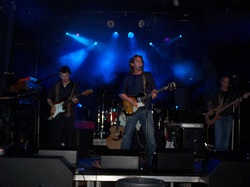
In 1999 Ralph spent some time in the studio with each of The Bad Examples' line-ups recording songs which had been played live but never recorded during each of the incarnations of the band. The goal was an album which would span the history of the band, and be released on the anniversary of the band being together for 5,000 days. A studio album seemed to take the focus of the music away from where it needed to be, so plans were made to have a show which featured the three major line-ups of the band (the only line-up not represented was the John Duich/Cheap Beer Night line-up.)
The 5,000 Days show was held on April 15, 2000 at FitzGerald's. It featured three sets, one with the Bad Is Beautiful line-up of Tommy O'Brien, Terry Wathen, Pickles Piekarski, and Ralph Covert; one with the Kisses 50 cents line-up of Steve Gerlach with Terry, Pickles, and Ralph; and one with the final club line-up of the band of Rob Newhouse, Ron Barnes, Steve Wozny, with Pickles and Ralph. Billed as a 'farewell' show, it was more a putting to rest of The Bad Examples as an active project in a way which honored and celebrated the achievements of the band and its members through the years.
In 2001 the band released "5000 Days," featuring highlights of the 5000 Days show, and the band began playing shows featuring Terry Wathen, Pickles Piekarski, Tommy O'Brien, and Steve Gerlach. The same line-up also assembled several times over the next few years with producer Joshua "Cartier" Cutsinger, who had produced many of the Ralph's World albums. Those tracks were an essential part of what became The Bad Examples' 2011 release Smash Record. Covert, O'Brien, Piekarski, Ron Barnes, Rich Parenti, Matt Lewis, and Andy Jones also teamed up in the late '90's and early 2000's to perform as the Ralph Covert Septet, performing instrumental music behind The Midnight Circus' acrobatic circus fairy tale, The Flower Thieves. The show was produced six times, and a CD of the music was released in 2002.
The band continues to perform live with a line up that features drummer Larry Beers, keyboardist Mike Hartigan, Tommy O'Bren, and Ralph. Since bass player Pickles Piekarski's passing in August of 2013, Eli Bennett, Jon Paul, and Brian Sheridan have all filled in on bass. What the future holds is yet to be determined, but it will certainly contain many great live shows and more additions to The Bad Examples' recorded legacy. See you at a show real soon!
The 5,000 Days show was held on April 15, 2000 at FitzGerald's. It featured three sets, one with the Bad Is Beautiful line-up of Tommy O'Brien, Terry Wathen, Pickles Piekarski, and Ralph Covert; one with the Kisses 50 cents line-up of Steve Gerlach with Terry, Pickles, and Ralph; and one with the final club line-up of the band of Rob Newhouse, Ron Barnes, Steve Wozny, with Pickles and Ralph. Billed as a 'farewell' show, it was more a putting to rest of The Bad Examples as an active project in a way which honored and celebrated the achievements of the band and its members through the years.
In 2001 the band released "5000 Days," featuring highlights of the 5000 Days show, and the band began playing shows featuring Terry Wathen, Pickles Piekarski, Tommy O'Brien, and Steve Gerlach. The same line-up also assembled several times over the next few years with producer Joshua "Cartier" Cutsinger, who had produced many of the Ralph's World albums. Those tracks were an essential part of what became The Bad Examples' 2011 release Smash Record. Covert, O'Brien, Piekarski, Ron Barnes, Rich Parenti, Matt Lewis, and Andy Jones also teamed up in the late '90's and early 2000's to perform as the Ralph Covert Septet, performing instrumental music behind The Midnight Circus' acrobatic circus fairy tale, The Flower Thieves. The show was produced six times, and a CD of the music was released in 2002.
The band continues to perform live with a line up that features drummer Larry Beers, keyboardist Mike Hartigan, Tommy O'Bren, and Ralph. Since bass player Pickles Piekarski's passing in August of 2013, Eli Bennett, Jon Paul, and Brian Sheridan have all filled in on bass. What the future holds is yet to be determined, but it will certainly contain many great live shows and more additions to The Bad Examples' recorded legacy. See you at a show real soon!
